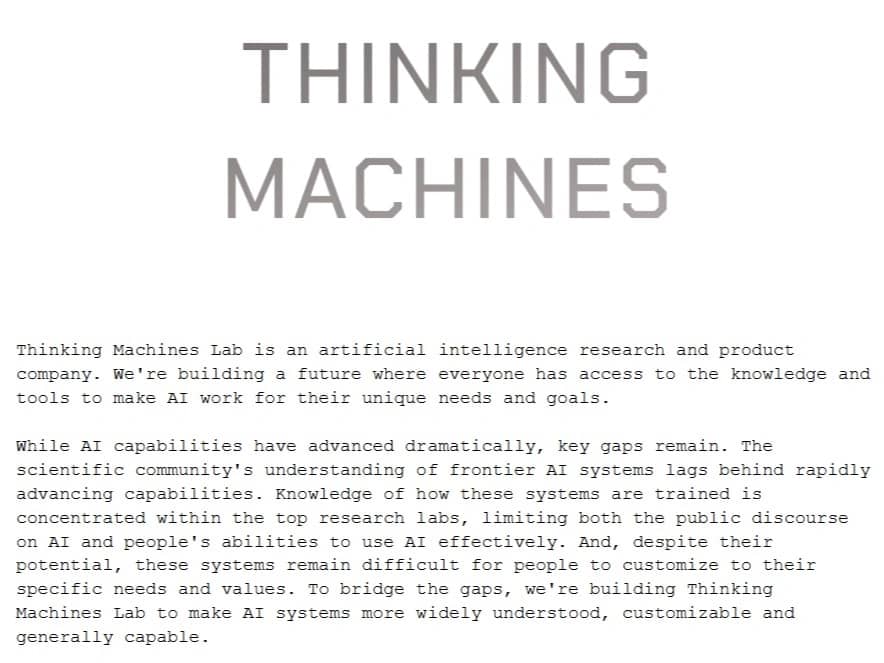Subscribe to wiki
Share wiki
Bookmark
Thinking Machines Lab
The Agent Tokenization Platform (ATP):Build autonomous agents with the Agent Development Kit (ADK)
0%
Thinking Machines Lab
Thinking Machines Lab is an artificial intelligence (AI) research and product company focused on making AI systems more widely understood, customizable, and generally capable. The company aims to bridge existing gaps in the scientific community's understanding of frontier AI systems and the public's ability to effectively use and customize these technologies [1].
Overview
Thinking Machines Lab was founded with the mission to democratize access to AI knowledge and tools, enabling individuals and organizations to leverage AI for their unique needs and goals. The company identifies key challenges in the current AI landscape, including the limited understanding of advanced AI systems outside top research labs, the concentration of knowledge regarding AI training, and the difficulty users face in customizing AI to their specific requirements and values. To address these issues, Thinking Machines Lab emphasizes human-AI collaboration, the development of flexible and adaptable multimodal systems, and a commitment to open science and ethical innovation [1].
The company's strategy involves an interdisciplinary approach, integrating AI development with insights from various fields such as science and policy. This method is intended to foster ethical innovations and enhance the scalability of AI solutions to global challenges like climate change and disease eradication. Thinking Machines Lab positions itself as a counterpoint to siloed AI development, promoting open collaboration and diverse perspectives to ensure equitable progress in the evolving AI landscape [2].
History
The Thinking Machines Lab was co-founded by Mira Murati, who previously served as the Chief Technology Officer (CTO) of OpenAI and played a key role in the development of ChatGPT. Murati co-founded the company with a group of OpenAI veterans, including OpenAI co-founder John Schulman, former vice president of research Barret Zoph, safety and robotics researcher Lilian Weng, pretraining and reasoning specialist Andrew Tulloch, and post-training specialist Luke Metz [6]. The founding team comprises experienced scientists, engineers, and builders who have contributed to some of the most widely used AI products and open-source projects. These include ChatGPT and Character.ai, open-weights models like Mistral, and popular open-source initiatives such as PyTorch, OpenAI Gym, Fairseq, and Segment Anything [1]. The company officially emerged from stealth mode upon announcing its significant seed funding round [3].
Funding
Thinking Machines Lab secured a historic $2 billion seed funding round in July 2025, valuing the company at $12 billion [7]. This financing marks the largest seed round in venture capital history. The round was led by Andreessen Horowitz (a16z), with participation from other prominent investors including Accel, AMD, Cisco, Jane Street, Nvidia, and ServiceNow [2] [5] [7].
The funding scale is particularly notable as it represents the largest seed investment ever for a female-led startup, highlighting persistent gender disparities in venture capital. In 2024, startups with at least one female founder raised $38 billion, but women-led teams accounted for only 2.1% of total venture capital dollars, despite data suggesting higher capital efficiency in women-founded ventures. Mira Murati's success in securing this unprecedented capital is seen as a significant step towards redefining possibilities for female founders and overcoming systemic biases in the technology sector [2].
On June 5, 2025, Albania announced a strategic investment of 1 billion lek (approximately $11.6 million USD) in Thinking Machines Lab. This funding, presented to parliament by Finance Minister Petrit Malaj, was channeled through the Albanian Investment Corporation, utilizing revenue from confiscated assets. Minister Malaj emphasized the investment's strategic importance for Albania, noting its potential to boost the country’s international profile, facilitate knowledge transfer, enable pilot initiatives in the public sector, and provide targeted support for local tech startups [4].
Products
On October 1, 2025, Thinking Machines Lab launched its first product, a tool named Tinker, which is designed to automate the creation of customized frontier AI models [6].
Tinker
Tinker aims to make the process of fine-tuning advanced AI models more accessible to a broader range of users, including businesses, researchers, and hobbyists. The tool automates much of the complex work involved, such as managing GPU clusters and utilizing various software tools to ensure training runs are stable and efficient. The company's stated goal with Tinker is to empower more people to experiment with and conduct research on frontier AI, helping to demystify the process and distribute capabilities more widely [6].
The platform initially allows users to fine-tune two open-source models: Meta's Llama and Alibaba's Qwen. Users can interact with the Tinker API to start fine-tuning through methods like supervised learning (adjusting the model with labeled data) or reinforcement learning (tuning models based on positive or negative feedback on their outputs). Once a model is fine-tuned, users can download it and run it on their own systems. The company's co-founder, John Schulman, noted that the tool abstracts away the complexities of distributed training while giving users full control over the data and algorithms used in the training loop [6].
The launch of Tinker reflects the company's commitment to open-source principles and a belief that fine-tuning will be a significant area of development in the AI field. Mira Murati expressed hope that making these tools accessible would help reverse the trend of powerful AI models becoming increasingly closed and proprietary [6].
Team and Recruitment
Thinking Machines Lab is composed of a high-caliber team of machine learning scientists and engineers. These individuals have a strong track record of contributions to significant AI projects and open-source initiatives, including ChatGPT, Character.ai, Mistral, PyTorch, OpenAI Gym, Fairseq, and Segment Anything [1].
The company has attracted attention from major technology firms seeking top AI talent. In July 2025, Meta, led by Mark Zuckerberg, approached more than a dozen staffers at Thinking Machines Lab to discuss joining its new Superintelligence Labs. One individual reportedly received an offer exceeding $1 billion, as part of Meta's broader campaign to recruit leading AI researchers [3].
See something wrong?
The Agent Tokenization Platform (ATP):Build autonomous agents with the Agent Development Kit (ADK)
